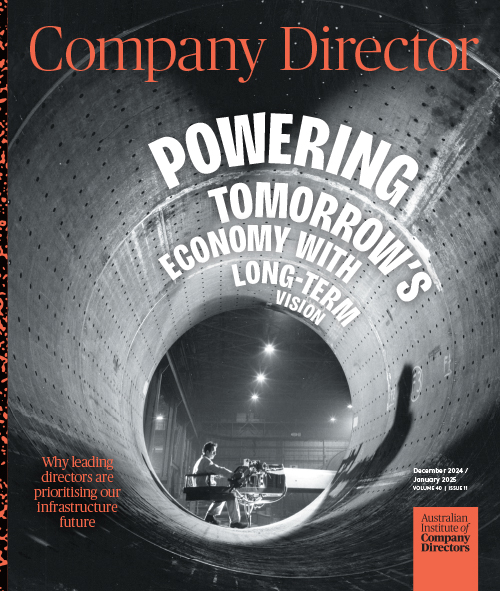Even amid the challenges of an election year, boards have much to gain by establishing long-term trusted relationships with government, writes Timothy Longstaff MAICD.
The COVID-19 pandemic and recent events such as the COP26 climate conference have reinforced the determinative role played by government in Australian business life. Many companies were saved by government initiatives such as JobKeeper. Government approaches to net zero will affect many aspects of Australia’s carbon-intensive economy. These policy positions will be as instrumental in defining a company’s future as strategies designed in the boardroom, illustrated by much of the electricity generation industry. Regulation can be company-defining, just ask the banks or any aged care provider. Other businesses have the government as a major customer — think pathology or infrastructure service providers.
It follows that boards should be interested in ensuring a constructive relationship is formed with government at multiple levels — and how this is done. More is needed than the “soft-shoe shuffle” around the corridors of Parliament House with an orange pass. So what are the lessons for maximum effectiveness in government engagement?
Influence at multiple levels
Yes, ministers have considerable authority, but their willingness and ability to use it is constrained. Ministers generally act on departmental advice. The art is in shaping this advice, or the structure of a program, rather than seeking to change its outcomes. To do this well, it is necessary to influence and build trusted partner relationships at multiple levels over many years.
First, influence departmental officials (bureaucrats) who bring an excellent understanding of good policy formation and whole-of-government priorities. Senior public servants are smart, committed and very knowledgeable in their fields. Second, ministerial advisers are an excellent bridge reconciling the policy drivers of departments with the political objectives of the government. They are also trusted by their time-poor ministers. Engaging across government, with the Opposition and minor parties is a valuable source of context with a different perspective, and an insurance policy for the future. Finally, yes, endeavour to speak to the relevant minister(s) — but the effectiveness of this will be greatly determined by the foundation laid in other discussions.
Stay balanced
Some requests are manifestly one-eyed.
I recall one meeting when a strong case for the effectiveness of a product was laid out, followed by a request that its use be mandated by legislation. That was never going to happen, and neither did a second meeting. Conversations need to be genuinely linked to the policy objectives of the government, balance the competing views of the many stakeholders, be grounded in political pragmatism, and recognise the competing and sometimes contradictory demands of government. Think about and proactively ameliorate issues. In government, it is often the neatest package that wins.
Be a partner
Participants in government at all levels, and from all parties, want the best for Australia. They accept there is much they don’t know, and that business has a key role to play in innovation and investment. Companies and people with some of the best outcomes built trusted partner relationships at multiple levels. Government is hungry for real-world news of industry challenges, business conditions and economic trends. Trusted partner relationships are built in these discussions, even when business has no immediate ask. They are also built through investing real time into roundtables and advisory boards formed by government to foster collaboration — painful and time-consuming as this is, at times. Trusted sounding boards get the first call.
Involve the CEO and business operators
Government relations professionals do an important job being across issues, contributing to industry bodies, and maintaining relationships. Supplementing this, senior business leaders offer a depth of insight and expertise that is impactful, especially with ministers. I saw many ASX 20 CEOs actively engaged in building relations with government — positioned as industry leaders with genuine insight. Equally, I saw company chairs share valued whole-of-economy perspectives. Some aspects of government liaison cannot be delegated.
Expect it will take time
Many would say government is “slow”, although during the pandemic it did show a remarkable nimbleness. I would say that it is “measured”. Business often underestimates the complexity of government, the fact that it is often left with the hardest problems, and that government is very concerned with long-term policy and precedent implications of decisions. Consultation within government is therefore substantial.
This takes time, often measured in years or across government terms. Businesses that succeed will recognise this and have sustained effective engagement. This is a race won by tortoises, not hares.
In conclusion
Australia is a country remarkably well-governed on any global comparison. There are great challenges as Australia confronts an ageing population, moves to net zero and deals with a pandemic-related large national debt. But we remain the “lucky country” with an educated and skilled workforce, growth industries such as hydrogen, and our proximity to the Asian economic powerhouse.
Our ability to confront the challenges and capture the opportunities of the future will be assisted by an effective and broad-based partnership between government and business. Boards should have on their agendas consideration of whether and how they influence government.
Latest news
Already a member?
Login to view this content


